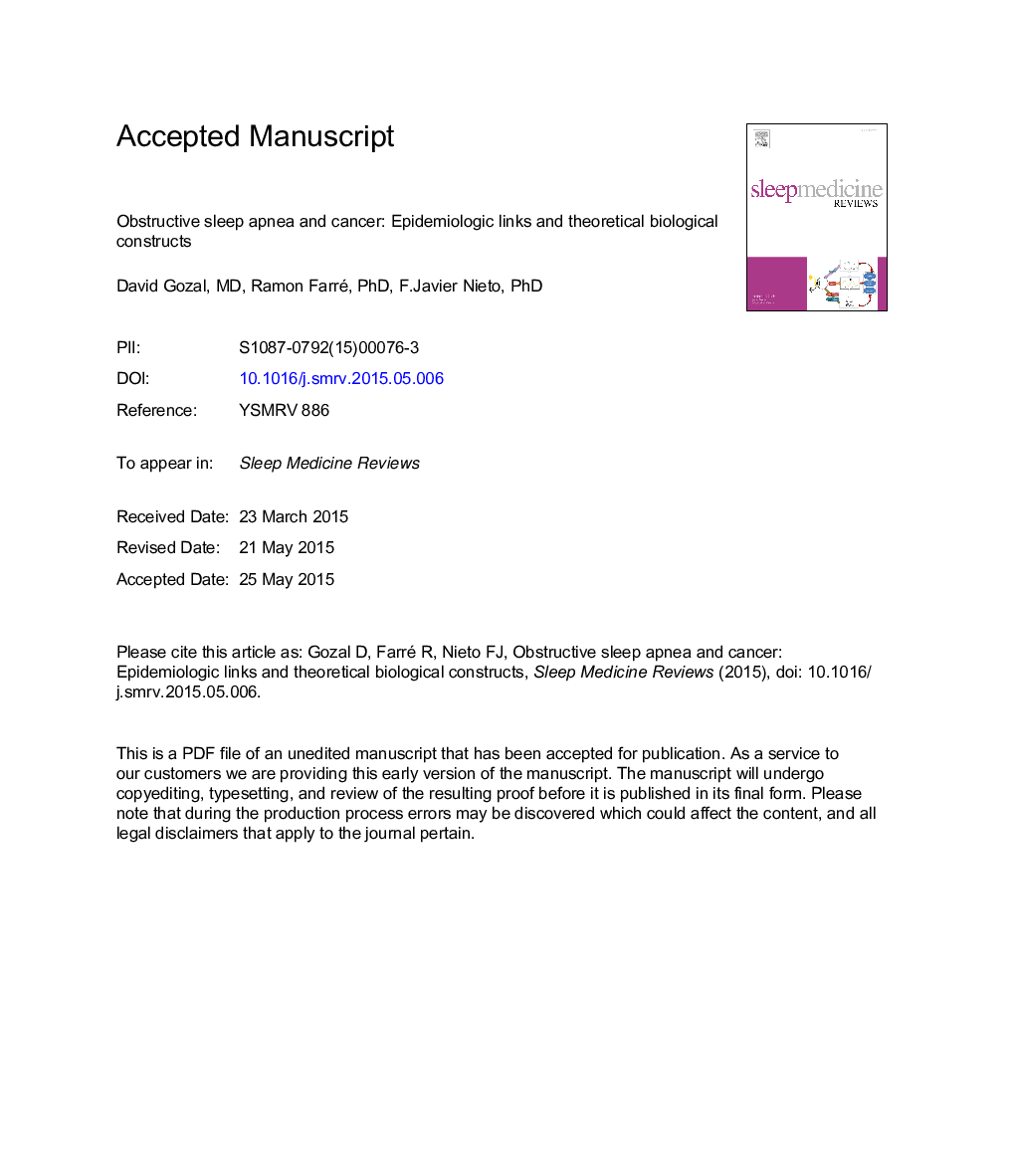| کد مقاله | کد نشریه | سال انتشار | مقاله انگلیسی | نسخه تمام متن |
|---|---|---|---|---|
| 6042824 | 1581357 | 2016 | 60 صفحه PDF | دانلود رایگان |
عنوان انگلیسی مقاله ISI
Obstructive sleep apnea and cancer: Epidemiologic links and theoretical biological constructs
ترجمه فارسی عنوان
آپنه انسداد خواب و سرطان: پیوندهای اپیدمیولوژیک و ساختارهای بیولوژیکی نظری
دانلود مقاله + سفارش ترجمه
دانلود مقاله ISI انگلیسی
رایگان برای ایرانیان
کلمات کلیدی
آپنه خواب محرومیت از خواب، هیپوکسی متناوب، سرطان، التهاب ماکروفاژهای مرتبط با تومور،
ترجمه چکیده
اختلالات خواب در طی 50 تا 75 سال گذشته به عنوان شرایط بسیار شایع ظاهر می شوند. در کنار درک بهتر این اختلالات، تحقق این نگرانی که اختلالات در معماری خواب و تداوم ممکن است موجب ایجاد، تشدید یا مدولاسیون بیان فنوتیپ های بیماری های متعدد از جمله سرطان شود، افزایش یافته است. علاوه بر این، هیپوکسی متناوب که همراه با تنفس اختلال خواب است، به تازگی در افزایش بروز و پیش آگهی پیش آگهی سرطان مرتبط است. چارچوب مفهومی متحد کردن ارتباط این انجمن ها پیشنهاد می دهد که افزایش فعالیت سمپاتیک و یا تغییرات در عملکرد سیستم ایمنی، به خصوص بر روی جمعیت سلولی ایمنی بدن، اثرات زیان آور اختلالات خواب بر روی زیست شناسی تومور را پایه ریزی می کند. در این بررسی، شواهد اپیدمیولوژیکی که موجب اختلال در خواب و هیپوکسی متناوب به پیامدهای انکولوژیک می شود، و زمینه های بالقوه بیولوژیکی چنین انجمن هایی را که توسط مدل های آزمایش تجربی نشان داده می شود، مورد انتقاد قرار می دهند. نتیجه گیری فوقالعاده در شکلگیری چارچوب فرضی حائز اهمیت است که در آن خواب تقسیم شده و هیپوکسی متناوب میتواند تغییرات سیگنوزوم چندگانه و عوامل رونویسی را تحریک کند که نه تنها میتواند تبدیل بدخیم را آغاز کند، بلکه میکروسکوپی تومور را نیز مختل میکند، تسریع گسترش تومور و افزایش تهاجم محلی و متاستاتیک. برای بررسی بیشتر این فرضیه ها، مطالعات تجربی مبتنی بر پایه آینده و همچنین مطالعات اپیدمیولوژیک بالینی دقت انجام شده و کنترل شده، توجیه می شود.
موضوعات مرتبط
علوم زیستی و بیوفناوری
علم عصب شناسی
عصب شناسی
چکیده انگلیسی
Sleep disorders have emerged as highly prevalent conditions in the last 50-75 y. Along with improved understanding of such disorders, the realization that perturbations in sleep architecture and continuity may initiate, exacerbate or modulate the phenotypic expression of multiple diseases including cancer has gained increased attention. Furthermore, the intermittent hypoxia that is attendant to sleep disordered breathing, has recently been implicated in increased incidence and more adverse prognosis of cancer. The unifying conceptual framework linking these associations proposes that increased sympathetic activity and/or alterations in immune function, particularly affecting innate immune cellular populations, underlie the deleterious effects of sleep disorders on tumor biology. In this review, the epidemiological evidence linking disrupted sleep and intermittent hypoxia to oncological outcomes, and the potential biological underpinnings of such associations as illustrated by experimental murine models will be critically appraised. The overarching conclusion appears supportive in the formulation of an hypothetical framework, in which fragmented sleep and intermittent hypoxia may promote changes in multiple signalosomes and transcription factors that can not only initiate malignant transformation, but will also alter the tumor microenvironment, disrupt immunosurveillance, and thus hasten tumor proliferation and increase local and metastatic invasion. Future bench-based experimental studies as well as carefully conducted and controlled clinical epidemiological studies appear justified for further exploration of these hypotheses.
ناشر
Database: Elsevier - ScienceDirect (ساینس دایرکت)
Journal: Sleep Medicine Reviews - Volume 27, June 2016, Pages 43-55
Journal: Sleep Medicine Reviews - Volume 27, June 2016, Pages 43-55
نویسندگان
David Gozal, Ramon Farré, F. Javier Nieto,
